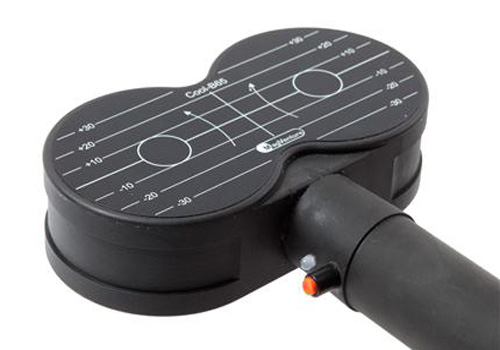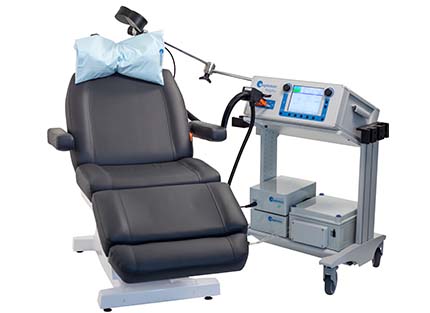Transcranial Magnetic Stimulation rTMS
Repetitive Transcranial Magnetic Stimulation (rTMS) is an innovative, safe, effective and well-tolerated, non-invasive treatment for patients that suffer with a number of conditions including Depression, Migraines and Tinnitus. rTMS is an effective and well-tolerated alternative treatment for patients that did not benefit from other treatment with medications due to side-effects or wish to treat their condition without medication. rTMS is a NICE approved treatment for depression in the UK since December 2015.
The rTMS Treatment
The treatment is administered by highly trained staff with experience in mental health and rTMS. The response to treatment will be monitored by a Consultant Psychiatrist. During the session you can talk, listen to music, relax or sleep. Immediately after the treatment you can resume all your normal activities (including driving).

The Coils
The coil generates brief magnetic pulses, which pass easily and painlessly through the skull and into the brain. the pulses generated are of the same type and strength as those generated by magnetic resonance imaging (MRI) machines. When these pulses are administered in rapid succession, it is referred to as “repetitive TMS” or “rTMS” which can produce longer lasting changes in brain activity.
The electro-magnetic effect
In rTMS , repetitive pulses of electromagnetic energy are delivered at various frequencies or stimulus intensities. Conventional rTMS is a repetition of individual pulses at a pre-set interval (train of pulses) whereas theta burst rTMS is a short bursts of pulses at a pre-set interval (train of bursts).

The rTMS Equipment
rTMS for Depression
- Depression of any severity, including severe depression.
- Treatment resistant depression that has not responded to antidepressant medication.
- Intolerance to side effects of antidepressant (weight gain, Sexual side effect, sleep problems, etc).
- Post-natal depression, including women who wish to breastfeed and avoid transmission of antidepressants medication to the baby through the milk.
- Those who do not wish to have ECT (electro-convulsive therapy).
Advantages of the rTMS
- Highly effective
- Few or no side effects
- Outpatient therapy
- You can assume your normal activities immediately after treatment including driving
- Painless
- Non-invasive and relaxing
- No anaesthesia required
- Fast; usual response within 3-4 weeks
- Long lasting effect
- Patients do not have to stop taking medication in order to receive rTMS
- Patient tailored: The treatment parameters are determined individually for each patient
- Excellent ability to target specific neuron circuits
- Ability to provide therapeutic benefit for treatment-resistant individuals
- rTMS does not interact with other treatments
- No discontinuation syndrome
- No risk of overdosing
- Avoid side effects such as: nausea, fatigue, weight gain, insomnia, decreased libido, memory loss, sweating, increased heart rate, dry mouth and nightmares
Our rTMS Equipment
Side Effects of rTMS
rTMS is a safe procedure and there are safety guidelines that are followed by trained professionals.
- Headaches 4-10% usually mild
- Scalp discomfort at the site of stimulation 2-9%,
- Tingling, spasms or twitching of facial muscles 2%
- Discomfort from noise during treatment
- Other rare side effects include seizures (2 per 1,000 cases)
Contraindications
- History of epilepsy.
- Stroke and/or recent neurosurgery.
- Some neurological disorders.
- Those who have metal plates in the head /brain.
- Pacemakers (including heart pacemakers) or other electronic implants.
- Ear implants.
- Medication pumps.
- People with severe alcohol and / or drug dependency.
- Age below 18 years.

